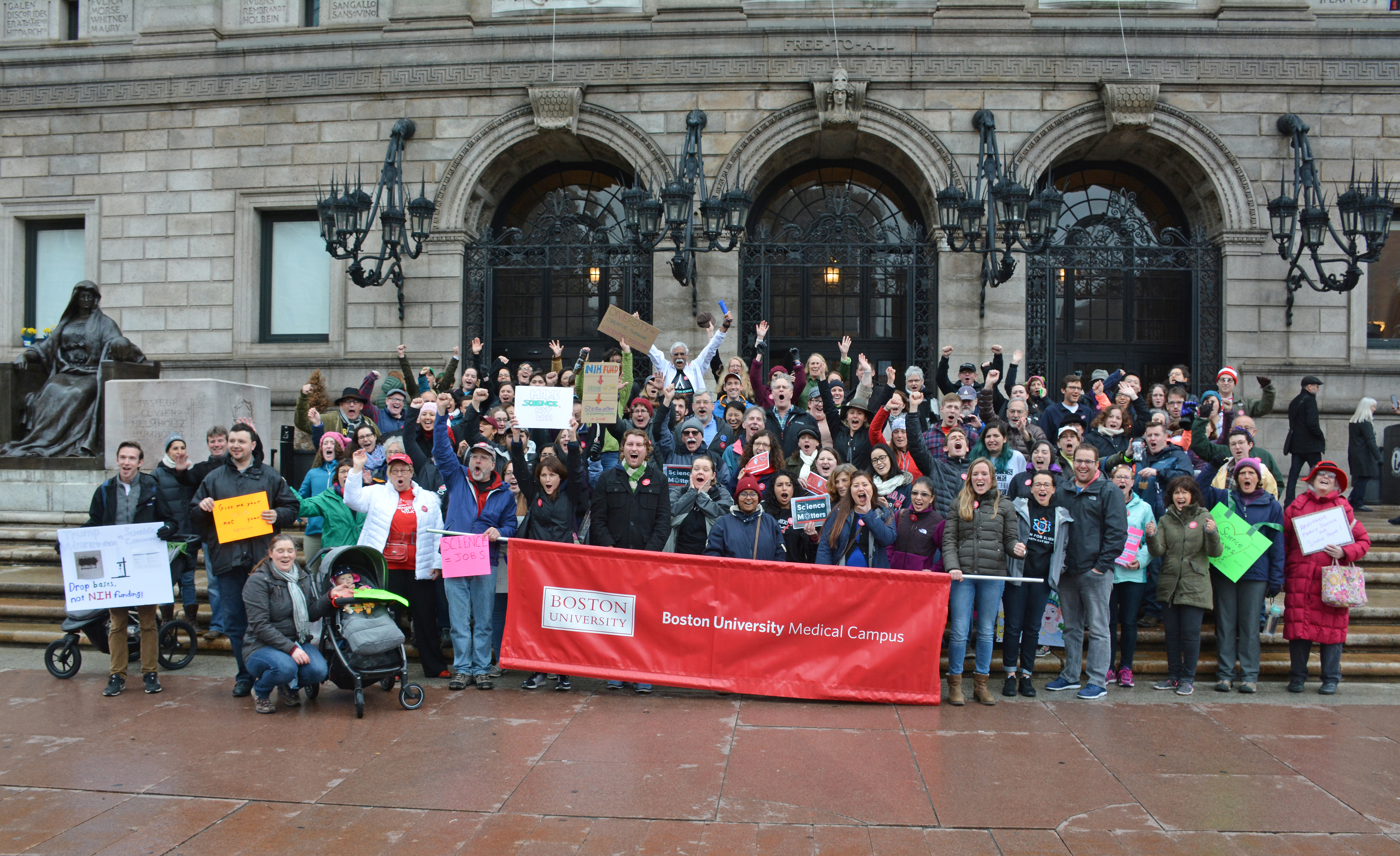BUMC Community Spreads Message of Inclusivity at March for Science
Determined to communicate their message of inclusivity and support for science, nearly 100 of BUMC faculty, staff and students braved the rainy, chilly weather to carry colorful — and sometimes politically nuanced — signs as they marched toward Boston Common for the March for Science on Saturday afternoon.
Although their motivations for participating were varied, they all hoped to share positive messages about the impact science has on their lives and the need to have their voices heard.
 Faculty, staff and students gather at the steps of the Boston Public Library before marching to Boston Common.
Faculty, staff and students gather at the steps of the Boston Public Library before marching to Boston Common.
Linda Hyman, PhD, associate provost of the Division of Graduate Medical Sciences, said she decided to march because it is important to communicate to the community at large that science is important, science saves lives and science is part of our everyday lives.
“What keeps me up at night is the training of the future leaders of the biomedical workforce,” Hyman said. “I am concerned that we are sending the message that science isn’t as important as it used to be.”
Ben Wolozin, MD, PhD, professor of pharmacology and experimental therapeutics, said he was inspired to participate in the March for Science in order to stand up for what he calls “evidence-based policy.”
“I don’t see how a company can run without addressing facts, I don’t see how you can plan your budget at home without addressing facts, and I don’t see how the government or Americans can address the future well without addressing facts,” he said.
Wolozin, whose research focuses on the causes of, and potential treatments for, neurodegenerative diseases such as Alzheimer’s or Parkinson’s, said funding cuts to the National Institutes of Health would have far-reaching effects.
“Just the threat of funding cuts to the National Institutes of Health has had an impact on science,” Wolozin said.
Jasmeet Hayes, PhD, assistant professor of psychiatry and research psychologist at the National Center for PTSD at the VA Boston Healthcare System, marched in order to speak up for military personnel and veterans.
“It is fundamentally important to support science,” Hayes said. “There are still a lot of treatments that don’t work for everybody, so we have to continue the scientific process and come up with the treatments that help as many people as we can.”
Hayes, whose research involves examining the effects of PTSD and Traumatic Brain Injury on the brain and cognition for military personnel and veterans, said she hoped marching would raise awareness that science can affect people on a personal, day-to-day level.
“The bottom line is if you support our veterans, you need to support science,” Hayes said.
PhD candidate Alicia Wooten was one of the featured speakers at the event. Wooten is deaf, and took the opportunity to discuss the importance of inclusivity in science.
“I didn’t need to hear a single thing to know that I could make a difference in science, despite other people’s doubt,” Wooten said. “It doesn’t matter what kind of disability you have, or the color of your skin or your gender. It is about what you can bring to the table. I am a scientist who just happens to be deaf.”
Brad Zehr, a fourth-year medical student, is concerned about the national dialogue surrounding science. He feels science is being disrespected on many levels. As a student looking forward to starting his residency, he said he could be especially impacted by potential funding cuts.
“Part of the responsibility of having the privilege of being so highly educated is to be very public about why we need to respect science and fund science,” he said. “Suddenly it’s very real to me when science is threatened because that is going to be my livelihood. We need to be the generation that stands up for science.”
See the Facebook album for more photos of the March.
View all posts